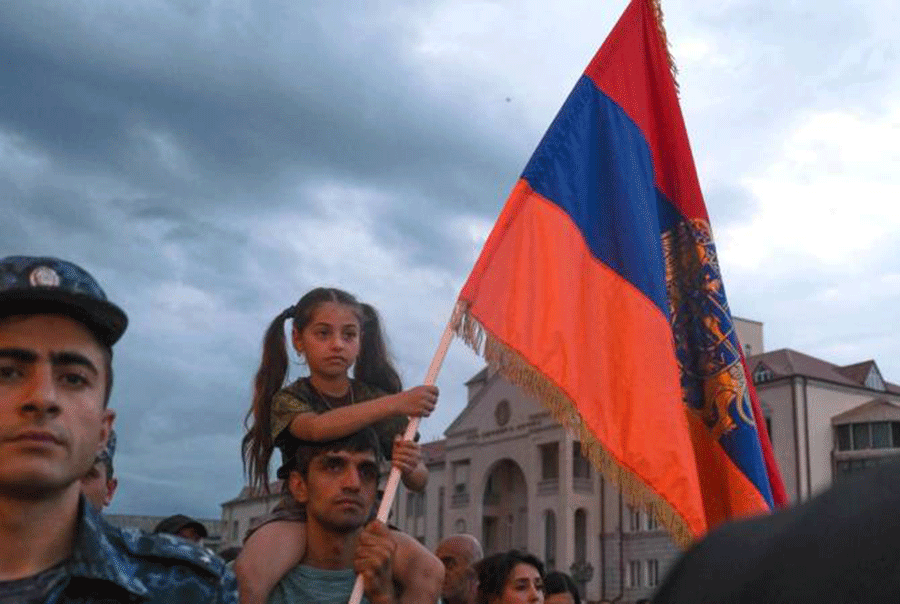By Harut Sassounian
Publisher, The California Courier
There is a dispute among those who want to struggle for the recovery of Artsakh and those who say that Artsakh is lost forever and that we should forget about it. The latter shameful position is promoted by the current regime in Armenia which is responsible for losing Artsakh and is now doing everything possible to bury its memory.
Read also
I would like to share with the readers my decades-long view on the recovery of Western Armenia and its parallels to actions we need to take for Artsakh.
After every lecture I have given around the world on the Armenian Genocide and Western Armenia, some of the attendees immediately ask: what is the point of pursuing such a lost cause, particularly since the powerful Turkish military is occupying our historic lands?
I respond by saying that the worst thing Armenians can do now is to forget about Western Armenia. That is the surest way of losing forever our Armenian territories.
In addition to doing everything possible now, Armenians need to transmit to the next generation our demands for Artsakh and Western Armenia in order to keep the dream alive. If we don’t, our future generations, not knowing anything about our historic lands, will have no idea that they belong to us. Consequently, even if someday the geostrategic situation on the ground changes and an opportunity arises to recover our lost lands, our future generations will not show any interest in them.
Remember that for over 2,000 years, the Jewish people had lost their homeland and were dispersed throughout the world. The succeeding Jewish generations passed on the knowledge of their homeland to their offspring. For more than 2,000 years, parents transmitted the memory of Jerusalem and Israel to their children and they in turn passed it on to their children, and so on. They did not forget their roots and history while living in exile in Russia, Europe and elsewhere. They repeatedly told their children and grandchildren, ‘next year in Jerusalem!’ Two thousand years later, when the opportunity arose to recover their lands, they took advantage of it and realized their long-held dream. Palestinians, who were and still are forcefully displaced from their lands, are in a similar situation. They too are struggling to keep their dream alive and are proclaiming the right of return to their ancestral homes.
If Jewish people can keep their dream of returning to their homeland for 2,000 years, why can’t Armenians keep their dream alive of returning to Artsakh and Western Armenia someday? Armenians should tell their children and grandchildren: ‘next year in Shushi’ and ‘next year in Van’.
The question is: how can Armenians return to their lands someday if powerful enemies are occupying Artsakh and Western Armenia? We should not forget that nothing remains constant forever. There is not a single country in the world that has had the same boundaries since the beginning of history. Over the years, some countries have enlarged their borders, while others lost their territories. Some have become large empires, while others have disappeared from the face of the earth. But one thing is clear: No one can claim that today’s boundaries of Azerbaijan and Turkey will remain the same forever. Just 100 years ago, the vast and powerful Ottoman Empire was reduced to the much smaller territory of the Republic of Turkey. Even though it is not possible to predict the exact date when the boundaries of Azerbaijan and Turkey will change, they will certainly not remain the same. How will such changes come about? There are several scenarios, such as regional wars, even world war, civil war, and nuclear or other types of disasters. Such events have happened in the past and will surely happen again in the future.
When changes on the ground do take place, will future generations of Armenians know and have the memory that Artsakh and Western Armenia are part of their historic homeland or will they be clueless, having never heard of Shushi and Van? If they are deprived of that knowledge, when opportunities arise in the future, even if an unlikely benevolent Azeri or Turkish leader returns those lands to our grandchildren, they will not be interested in them, since they had never heard of them.
In conclusion, my advice is to keep the dream alive. While we are deprived of our lands due to the actions of our enemies, it is up to us not to lose the memory and dream of someday returning to our lands. Let’s pass on our demands to future generations. The enemy took away our lands, but did not and cannot take away our memory. By forgetting about our historic lands, we ourselves will be helping our enemies put the final stone on the grave of our cause!




















































